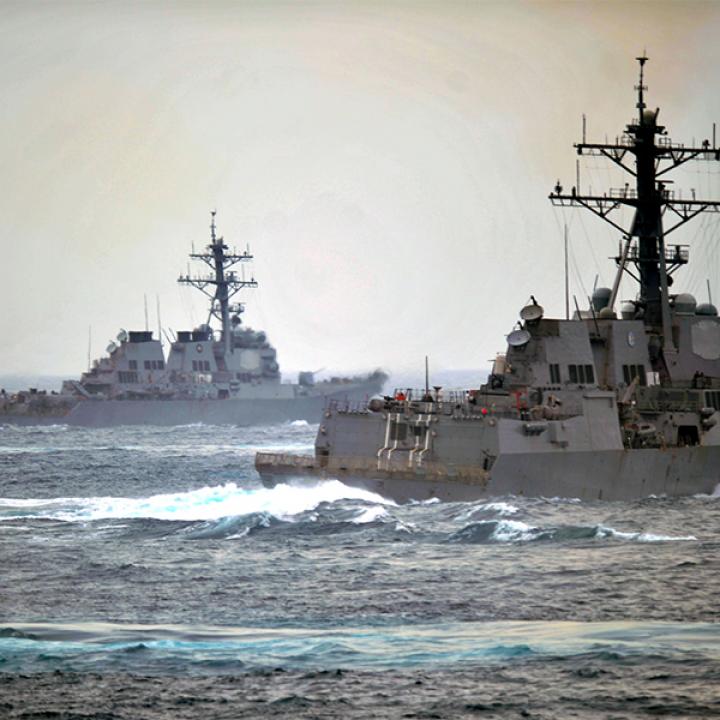
- Policy Analysis
- Articles & Op-Eds
3 Factors for the U.S. to Consider in Assessing Iran’s Role in Yemen Attacks

Publicly blaming Tehran for the recent missile strikes would be a serious matter, so U.S. officials need to go through several preparatory steps before deciding whether that is the best course of action.
After missiles fired from the coast of Yemen (unsuccessfully) targeted a U.S. Navy destroyer in the Red Sea on Oct. 9 and Oct. 12, U.S. officials unequivocally blamed the Shiite Houthi rebels that control Yemen's capital. U.S. forces responded to the attacks on the USS Mason by striking Houthi-held radar sites.
U.S. officials have been more cautious, however, when it comes to describing Iran's role in the attacks against U.S. vessels and another ship operated by the United Arab Emirates. It is natural that suspicion would fall on Iran: Tehran provides arms to the Houthis, and along with Hezbollah, its Lebanon-based proxy militia, has reportedly provided the rebels with training and other assistance. Senate Armed Services Committee Chairman John McCain has said it's likely that Iran supplied the missiles that were fired at the USS Mason. U.S. military officials have equivocated, saying that the missiles could have been supplied by Iran but might also have been older models that the Houthis seized from the Yemeni government arsenal.
Why the reticence? These attacks could have killed hundreds of U.S. sailors and service members. Publicly blaming Iran is a serious matter. Such a decision would involve three steps.
First, the evidence must be gathered and assessed. Intelligence analysts present senior policymakers not only with a conclusion but also with some indication of their confidence in it. That same case would have to be presented to other states involved -- the UAE and Saudi Arabia. It also has to be presented to Congress. There its reception -- like the Bush administration's briefings on Iranian involvement in Iraqi insurgents use of improvised explosive devices in the mid-2000s -- stands to be affected by partisan politics, given the polarizing nature of both the conflict in Yemen and U.S. policy toward Iran.
Second, the benefits of publicizing the U.S. assessment must be weighed against the costs. Those costs might be intelligence-related or operational; for example, the risks related to revealing our knowledge of Iranian operations (or the limits of that knowledge). They may also be related to policy, such as concerns about derailing the nuclear deal with Iran, or efforts to broker a cease-fire in Yemen, or simply a desire to take private diplomatic action before or instead of publicizing. But there may also be costs to failing to publicize what we know: The information could leak anyway, or U.S. credibility with allies could suffer. Such judgments call for prudence, but the line between prudence and diffidence or principal-agent bias can be a fine one.
Finally, if Iran is deemed responsible and that information is to be publicized, consideration must be given to what to do about it. Blaming Iran or any other party would inevitably generate calls for action, so officials want to make this determination (and possibly carry out any response) in advance of any briefing. Even if the intelligence is solid, the process may terminate here if action is deemed imprudent or unnecessary, in which case a public briefing could do more harm than good. The process may also return to step one. Officials who are initially convinced of the intelligence case may want additional proof before authorizing action, whether out of diligence or the need to convince skeptical parties at home and abroad. Just as facts inform what we do, what we are inclined or disinclined to do affects how facts are interpreted, for better or worse.
Which of these steps the Obama administration may be on -- if any -- is unclear. Nor, however, is it clear that proof of Iranian involvement in the attacks on the USS Mason should be a prerequisite for stronger action against Iranian arms proliferation in the Middle East, which is known to fuel instability not only in Yemen but also in Lebanon, Syria, Gaza, and elsewhere.
Michael Singh is the managing director and Lane-Swig Senior Fellow at The Washington Institute.
Wall Street Journal



